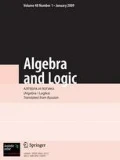References
S. S. Goncharov and Yu. L. Ershov, Constructive Models, Sib. School Alg. Log. [in Russian], Nauch. Kniga, Novosibirsk (1999).
A. I. Mal’tsev, “On recursive Abelian groups,” Dokl. Akad. Nauk SSSR, 146, No. 5, 1009-1012 (1962).
A. I. Mal’tsev, “Constructive algebras. 1,” Usp. Mat. Nauk, 16, No. 3, 3-60 (1961).
C. C. Chang and H. J. Keisler, Model Theory, North-Holland, Amsterdam (1973).
H. Rogers, Theory of Recursive Functions and Effective Computability, McGraw-Hill, New York (1967).
S. Goncharov and B. Khoussainov, “Open problems in the theory of constructive algebraic systems,” Cont. Math., 257, Am. Math. Soc., Providence, RI (2000), pp. 145-170.
A. T. Nurtazin, “Strong and weak constructivizations and computable families,” Algebra and Logic, 13, No. 3, 177-184 (1974).
S. S. Goncharov, “The problem of the number of non-autoequivalent constructivizations,” Dokl. Akad. Nauk SSSR, 251, No. 2, 271-274 (1980).
S. S. Goncharov, “Problem of number of nonautoequivalent constructivizations,” Algebra and Logic, 19, No. 6, 401-414 (1980).
S. S. Goncharov, “Groups with a finite number of constructivizations,” Dokl. Akad. Nauk SSSR, 256, No. 2, 269-272 (1981).
S. S. Goncharov, A. V. Molokov, and N. S. Romanovskii, “Nilpotent groups of finite algorithmic dimension,” Sib. Math. J., 30, No. 1, 63-68 (1989).
S. S. Goncharov, “Computable single-valued numerations,” Algebra and logic, 19, No. 5, 325-356 (1980).
E. B. Fokina, I. Kalimullin, and R. Miller, “Degrees of categoricity of computable structures,” Arch. Math. Log., 49, No. 1, 51-67 (2010).
B. F. Csima, J. N. Franklin, and R. A. Shore, “Degrees of categoricity and the hyperarithmetic hierarchy,” Notre Dame J. Form. Log., 54, No. 2, 215-231 (2013).
N. A. Bazhenov, “Degrees of categoricity for superatomic Boolean algebras,” Algebra and Logic, 52, No. 3, 179-187 (2013).
B. Anderson and B. Csima, “Degrees that are not degrees of categoricity,” Notre Dame J. Form. Log., 57, No. 3, 389-398 (2016).
E. Fokina, A. Frolov, and I. Kalimullin, “Categoricity spectra for rigid structures,” Notre Dame J. Form. Log., 57, No. 1, 45-57 (2016).
R. Miller, “d-Computable categoricity for algebraic fields,” J. Symb. Log.,74, No. 4, 1325-1351 (2009).
E. B. Fokina, V. Harizanov, and A. Melnikov, “Computable model theory,” in Turing’s Legacy: Developments from Turing’s Ideas in Logic, Lect. Notes Log., 42, R. Downey (ed.), Cambridge Univ. Press, Ass. Symb. Log., Cambridge (2014), pp. 124-194.
N. A. Bazhenov, “Autostability spectra for Boolean algebras,” Algebra and Logic, 53, No. 6, 502-505 (2014).
S. S. Goncharov, “Degrees of autostability relative to strong constructivizations,” Trudy MIAN, 274, 119-129 (2011).
E. A. Palyutin, “Algebras of formulas for countably categorical theories,” Coll. Math., 31, 157-159 (1974).
J. H. Schmerl, “A decidable ℵ0-categorical theory with a non-recursive Ryll-Nardzewski function,” Fund. Math., 98, No. 2, 121-125 (1978).
N. Bazhenov, “Prime model with no degree of autostability relative to strong constructivizations,” in Lect. Notes Comput. Sci., 9136, Springer-Verlag, Berlin (2015), pp. 117-126.
S. S. Goncharov, “On the autostability of almost prime models relative to strong constructivizations,” Usp. Mat. Nauk, 65, No. 5(395), 107-142 (2010).
M. Morley, “Decidable models,” Israel J. Math., 25, Nos. 3/4, 233-240 (1976).
R. Miller, “Revisiting uniform computable categoricity: For the sixtieth birthday of prof. Rod Downey,” Lect. Notes Comp. Sci., 10010, Springer, Cham (2017), pp. 254-270.
Author information
Authors and Affiliations
Corresponding author
Additional information
*Supported by SB RAS Fundamental Research Program I.1.1 (project No. 0314-2019-0002), by RFBR (project No. 17-01-00247), and by NSF (grant DMS-1600625).
**Supported by Simons Foundation (grant No. 581896), by PSC-CUBY Research Bonuses, and by NSF (grant DMS-1600625).
***Supported by Simons Foundation (grant No. 429466), by NSF (grant DMS-1600625), by CCAS, and by Dean’s Research Chair.
Translated from Algebra i Logika, Vol. 58, No. 3, pp. 417-425,May-June, 2019.
Rights and permissions
About this article
Cite this article
Goncharov, S.S., Miller, R. & Harizanov, V. Turing Degrees of Complete Formulas of Almost Prime Models. Algebra Logic 58, 282–287 (2019). https://doi.org/10.1007/s10469-019-09546-y
Received:
Accepted:
Published:
Issue Date:
DOI: https://doi.org/10.1007/s10469-019-09546-y

